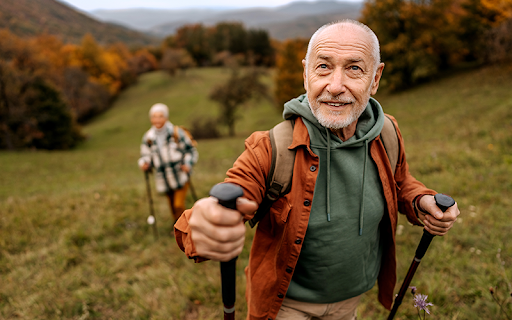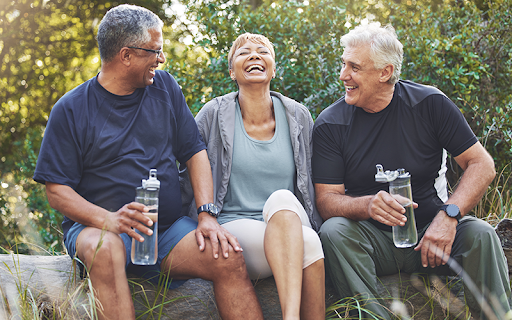
11 Helpful Tips on Hiking for Seniors
When it comes to aging well, older adults need to incorporate physical activity into their daily routines. The CDC states that staying physically active helps you feel and function better and improves your sleep.
Hiking is a popular form of exercise for many people because you immerse yourself in nature, breathe in the fresh air, and let your mind relax because you’re in a naturally calm environment. Take a look at the benefits of hiking for seniors and helpful tips on how to have a successful hike.
Benefits of Hiking for Seniors
When you go for a hike, you’re not only allowing yourself to enjoy the nature around you, you’re also benefiting your physical and mental health. Hiking health benefits include:
- Decreasing blood pressure
- Decreasing stress levels
- Boosting the immune system
- Restoring mental health
According to the National Park Service, hiking can reduce the risk of depression, and improve cardiovascular health and your mood.
With all these benefits right at your fingertips, you’re likely planning to hit the trails as soon as possible. Before you start your trek, be sure to check out these hiking tips.

11 Hiking Tips for Seniors
1. Wear Comfortable Shoes
Having appropriate footwear for hiking is one of the most important things you can do. Your hiking boots should support you, have good traction, and be comfortable.
2. Dress in Light Layers
When you’re wearing multiple light layers, you can protect yourself from the weather. If you’re getting too warm, the light layers will be easy to carry. You may also want to look into clothing that repels ticks and protects you from the sun.
3. Bring Water and Snacks
Staying hydrated and energized is important for hikers. Make sure you bring some extra water bottles and some high-protein snacks to give you a boost when you need them. Protein bars, dried fruit and nuts, and granola bars are lightweight snacks you can easily bring with you on the trail.
4. Wear Sunscreen and Bug Spray
Even if it’s not summer, you should wear sunscreen to protect yourself from the sun. You’ll also want to bring insect repellent to prevent bug bites.
5. Hike With Friends
Making the hike a social trip with your friends can be a great way to add fun and conversation to the hike, and it’s another important benefit to your health. You may have the opportunity to introduce someone to hiking, or a seasoned hiker may teach you something new.

6. Tell Others Your Plans
If you are hiking alone, make sure you tell someone that you’re going hiking. Let them know where you’re going, what trail you’re going to hike, and when you plan to be back. This way, you have the added security of someone knowing where you are.
7. Bring Navigation Tools
Having a phone with a navigation system, a compass, and a map in case the signal is spotty on the trail will help you keep your bearings.
8. Plan Your Trails
It’s common for hiking areas to have different trails with varying difficulty. You can look at the area you’re hiking and choose the trail that you want to do. You’ll also be able to tell if there are trails you should avoid because they’re on difficult terrain or are more miles than you’d want to hike.
9. Use Hiking/Trekking Poles
Hiking/trekking poles help you keep your balance, maintain your pace, and relieve pressure and lower the impact on your knees. You can use the poles to distribute your weight and help you navigate the trail more easily.
10. Check the Weather
Always check the weather forecast before you head out. Look for warnings of storms, rain, and extreme temperatures. You’ll want to make sure that weather conditions won’t change when you’re on the trail.
11. Bring a First Aid Kit
Bringing a first aid kit while you hike will give you the chance to address injuries in case of an emergency. Your emergency kit can include antibiotic ointment, band-aids, and any medications that you take if you’re out for longer than you intended can help you get back more quickly to the trailhead.
You could also pack extra snacks and clothes in your emergency kit in case you or another person needs them.
How To Start Hiking
If you’re wondering how you can get started with hiking, follow these three tips:
Start With Easy, Short Distances
Hiking doesn’t have to be an all-day trip. While you can certainly work up to that if you want to be an all-day hiker, beginning with short hikes that cover less distance can help you build your strength and confidence in hiking.
Listen to your body – hiking is all about being outside and feeling the joy of nature. When you’re tired, it’s important to know it’s time to rest. This can prevent feeling sore muscles or hurt joints the next day.
Make Plans With Friends
If you’re not sure about going hiking on your own, plan a short hiking trip with friends. You’ll have people who can help you if you need it, and you’ll get used to being on the trail.
Enjoy the Experience
You can set your own pace and take as many breaks as you want on your hike. If you want to stop and appreciate the trees or a gorgeous field, you definitely should.
You don’t need to worry about hiking the trail as quickly as possible or only getting to the end of the trail – you’re doing this as a fun way to get outside and enjoy the fresh air.
Explore the Trails around Timber Ridge at Talus
Are you a senior with a love of the great outdoors? Timber Ridge at Talus is the perfect community to enjoy the perks of a maintenance-free lifestyle as well as the lovely natural surroundings of Cougar Mountain. The next time you’re hiking in the area, call us at 425-437-2961 to schedule a visit and see what life in our community is like.

